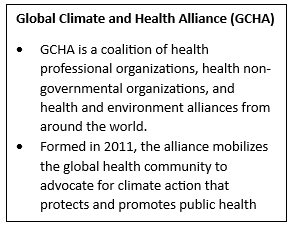Syllabus:
GS-3: Conservation, environmental pollution and degradation, environmental impact assessment
Context:
A new report by the Global Climate and Health Alliance (GCHA) reveals that fossil fuels are driving a global health emergency, causing widespread and lasting harm on people at every stage of life.
About the Study

- It is the second edition of the report titled “Cradle to Grave: The Health Toll of Fossil Fuels and the Imperative for a Just Transition” which finds that coal, oil, and gas harm health from extraction to combustion, leaving lasting illness, pollution, and environmental damage beyond carbon emissions.
- Case studies span oil extraction in Nigeria, industrial accidents in the U.S., coal spills in Malaysia, gas explosions in Mexico, and typhoon–coal plant impacts in the Philippines and India’s east coast, illustrating the global health harms of fossil fuel industries including those in South Africa and Australia.
- The report maps the entire fossil fuel lifecycle, revealing overlooked impacts on ecosystems, economies and communities long before and after combustion of fossil fuels.
Key Findings of the Study
- Every Stage of the Fossil Fuel Lifecycle Harms Health: Fossil fuels damage human health from each phase of extraction through processing, transport, combustion and post-use waste.
- Womb to Old Age: Impacts of fossil fuels are linked to low birth weight, congenital anomalies, asthma, cancers, neurological disorders, cardiovascular disease and premature deaths. Children and older adults are vulnerable.
- Persistent and Systemic Pollution: Heavy metals, benzene and particulate matter linger in soils, water and food chains for decades, exposing future generations.
- Unequal Burdens: Marginalised groups, Indigenous people, minorities, low-income populations are disproportionately exposed and have fewer healthcare protections, creating sacrifice zones.
- Social Disruption: Fossil fuel operations displace communities, disrupt livelihoods, fuel inequality, and exacerbate mental health crises and human rights violations.
- Policy Blind Spots: Despite growing evidence, climate and health policies largely ignore fossil fuel related health harms. International climate negotiations focus on CO₂ and methane, overlooking pollutants that cause cancer, neurological disorders, and social disruption
Key Suggestions of the Study
- Redirecting Subsidies to Clean Energy: Phasing out fossil fuel subsidies and investing in renewable energy could prevent millions of premature deaths while generating trillions in public revenue.
- Ensuring a Just and Rapid Transition: The study calls for a swift, fair shift away from fossil fuels, including halting new exploration, enforcing strict pollution controls, cleaning up toxic sites, and holding polluters financially responsible for health costs.
- Restricting Fossil Fuel Influence: The report urges curbing fossil fuel advertising and lobbying, akin to tobacco control, through bans on sponsorships, exclusion from forums like COP, and evidence-based campaigns to combat misinformation.
- End Fossil Fuel Finance: Redirect global capital flows to renewables; prevent stranded assets.
- Lead by Example in the Health Sector: Decarbonise healthcare systems, divest from fossil fuels, and humanise impacts through patient stories.

